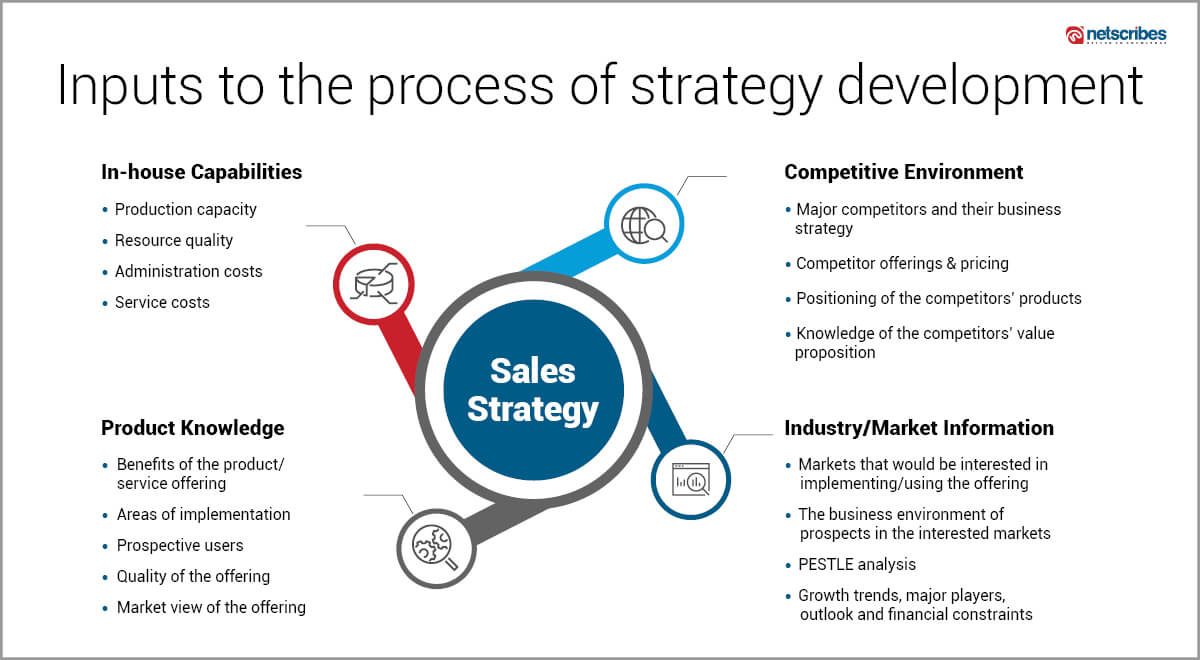Winning a potential sales deal requires the perfect blend of skill and data. While engaging with a prospect, sales reps are highly dependent on accurate account data, market information, and stakeholder insights. However, being time- and resource-crunched, they struggle to get their hands on conversion-triggering information when they need it the most. That’s where sales intelligence solutions can help. Sales intelligence acts as a catalyst at every step of the sales journey. It enables companies to enrich their sales processes with research-backed, insightful information paving the way for higher conversion rates and cost-efficiency.
Here’s how sales intelligence solutions can help develop competitive value across various stages of the sales process:
Developing an effective sales Intelligence solutions strategy
In order for a sales strategy to be effective, it’s highly crucial that those responsible for its development have access to relevant intelligence. For instance, if a company chooses to ignore the market realities, they could lose out on lucrative revenue opportunities and market share.
Sales intelligence helps organizations to keep track of emerging market scenarios, recognize patterns that affect their business and change their selling pattern accordingly. On the other hand, sales teams should also regularly provide strategic inputs to the SI team so that they understand the requirements and respond with relevant information.

Determining target prospects / lead generation
Sales executives are primarily engaged in the process of generating business, developing sales proposals and managing client relationships. They lack the expertise, time and effort needed to carry out the process of prospect identification and lead generation.
With rising competition, the process of lead generation has now become a specialized activity. Here’s where an efficient lead generation process that qualifies and reconfirms leads before lining them up for the sales team can boost productivity. Not just this, sales reps require regular insights into the prospect, its competitors, and customers to drive better conversions. That’s why sales intelligence must be at the core of an enterprises’ sales process, assisting sales teams in their prospecting, pricing, and closure decisions.
Devising a distinctive value proposition
A superior value proposition needs to be presented to a prospect to be able to convert it to a customer. In order to achieve this, staying in step with a prospect’s requirements so as to craft a tailored offering is immensely crucial. Here’s where sales intelligence can offer an edge. A deep understanding of the company’s in-house capabilities, the prospect’s ability to pay, and similar inputs can help sales professionals sell more intelligently. Such prospect-based intelligence can be obtained through a variety of secondary information sources like social media, news, blogs, analyst views, and market reports.
To give you head start, here are some key questions enterprises should seek to answer in collaboration with their SI team:
- What do we do that can help the prospect increase its revenue and achieve its goals?
- What do we do to help our customers meet the demand of their customers?
- What are the views of the company’s management with regards to the implementation of the product/solution being offered?
- What can our competitors offer to the prospect that may be detrimental to our sales processes and at what prices?
- What is the market perception of our solution/product offering?
Driving intelligent engagement through CRM
A continually changing business environment also demands exceptional Customer Relationship Management (CRM) skills from the sales executive managing client accounts. These executives need SI to identify the impact of change in a customer’s business and related industries. SI acts as a value add in the process of sales CRM and helps identify new business opportunities. Change in the client’s business can be identified as:
- Change in its product/service offering
- Change in its market scenario
- Change in its political/technological environment
- Change in its business strategy, corporate hierarchy, financial wellbeing etc.
Intelligence on the above issues can help sales execs identify and capitalize on opportunities for account expansion.
Globalization has increased competition making it difficult for enterprises to sell their products/services. Peter. F. Drucker, a leading management consultant who is considered to be the father of modern management, said that “Knowledge has become the key economic resource and the dominant, if not the only, source of competitive advantage” (Drucker, 1995).
Enterprises can no longer depend on word of mouth references or syndicated research reports to generate impressive sales results. It is essential to build on their market knowledge by integrating intelligence into their sales processes. They should have dedicated analysts to support the sales team with intelligence for focused and intelligent selling.
Some of the world’s leading enterprises across industry verticals rely on Netscribes’ custom sales and marketing intelligence solutions for meeting the demands of today’s hyper-competitive business environment. Contact us to know more.






